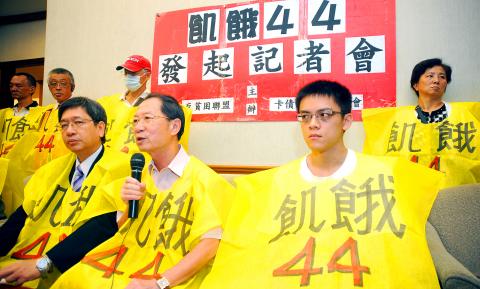Activists from the Anti-Poverty Alliance, which comprises 13 civic groups, held a press conference at the legislature in Taipei yesterday urging legislators to address the problem of the widening disparity between rich and poor in Taiwan.
They also announced plans for two 44-hour hunger strikes that will begin on Sunday.
Anti-Poverty Alliance representative Chien Hsi-chieh , a former Democratic Progressive Party lawmaker, said the gap between rich and poor is expanding in Taiwan, just like in the US and Europe.

Photo: Liu Hsin-de, Taipei Times
Taiwan’s economic growth rate last year was 10.8 percent and labor productivity increased by 16 percent, but wages decreased by 11 percent, the alliance said.
It said the total income of employees accounted for only 44 percent of GDP, which was lower than in many other countries.
Twenty-five people from Taiwan were listed on Forbes’ latest list of the world’s richest people, and the wealth of the top 10 richest people in the nation has increased from US$30 billion to US$40.7 billion, Chien said.
However, there are about 1.04 million workers in Taiwan who receive less than NT$20,000 per month, he added.
He also questioned why the government gave preferential treatment, such as a sales tax exemption, to banks but not to other sectors, and said mounting frustration over the plight of the average wage earner would express itself as it had in recent weeks on Wall Street.
“Occupy Wall Street is not a single incident, but is spreading around the world,” Chien said.
Chien said the alliance would hold two “44-Hour Famine” hunger strikes to raise awareness about the unfair distribution of wealth in the country, with workers not receiving their deserved share.
The hunger strikes will take place in front of the legislature. The first will run from Sunday to Tuesday and the second will run from Tuesday to Thursday.
The groups will also protest against the government giving tax relief to enterprises when the working poor are becoming poorer, and they want to experience poverty through fasting.
Chen Fang-yu (陳方隅), a representative from a group called “Young people want to be rich,” said that about one-fourth of young people in their 20s work as dispatch workers or as hourly wage workers, often with low incomes, long working hours and no welfare benefits.
He said with incomes so low and housing prices high, “who still wants to get married and have children?”
Lin Yung-sung (林永頌), an attorney who advises victims of credit card debt, said some workers are only paid about NT$20,000 per month and had to pay between NT$4,000 and NT$5,000 per month to labor dispatch agencies.
Lin said that as many as 1.04 million Taiwanese — or 15 percent of the working population — earn less than NT$20,000 a month.
That means there are 220,000 more people in that income group than in 2008, at the height of the global financial crisis, Lin said.
The alliance said unemployment and low incomes were the roots of poverty and called on legislators to amend the Statute For Consumer Debt Clearance (消費者債務清理條例), regulations on student loans and the Housing Act (住宅法) during the current legislative session.
The alliance also voiced support for the “Occupy Taipei” rally that is scheduled for Saturday outside Taipei 101.
Additional reporting by CNA

Taiwan is stepping up plans to create self-sufficient supply chains for combat drones and increase foreign orders from the US to counter China’s numerical superiority, a defense official said on Saturday. Commenting on condition of anonymity, the official said the nation’s armed forces are in agreement with US Admiral Samuel Paparo’s assessment that Taiwan’s military must be prepared to turn the nation’s waters into a “hellscape” for the Chinese People’s Liberation Army (PLA). Paparo, the commander of the US Indo-Pacific Command, reiterated the concept during a Congressional hearing in Washington on Wednesday. He first coined the term in a security conference last

Prosecutors today declined to say who was questioned regarding alleged forgery on petitions to recall Democratic Progressive Party (DPP) legislators, after Chinese-language media earlier reported that members of the Chinese Nationalist Party (KMT) Youth League were brought in for questioning. The Ministry of Justice Investigation Bureau confirmed that two people had been questioned, but did not disclose any further information about the ongoing investigation. KMT Youth League members Lee Hsiao-liang (李孝亮) and Liu Szu-yin (劉思吟) — who are leading the effort to recall DPP caucus chief executive Rosalia Wu (吳思瑤) and Legislator Wu Pei-yi (吳沛憶) — both posted on Facebook saying: “I

The Ministry of Economic Affairs has fined Taobao NT$1.2 million (US$36,912) for advertisements that exceed its approved business scope, requiring the Chinese e-commerce platform to make corrections in the first half of this year or its license may be revoked. Lawmakers have called for stricter enforcement of Chinese e-commerce platforms and measures to prevent China from laundering its goods through Taiwan in response to US President Donald Trump’s heavy tariffs on China. The Legislative Yuan’s Finance Committee met today to discuss policies to prevent China from dumping goods in Taiwan, inviting government agencies to report. Democratic Progressive Party Legislator Kuo Kuo-wen (郭國文) said

The Ministry of Economic Affairs has fined Taobao NT$1.2 million (US$36,900) for advertisements that exceeded its approved business scope and ordered the Chinese e-commerce platform to make corrections in the first half of this year or its license would be revoked. Lawmakers have called for stricter supervision of Chinese e-commerce platforms and more stringent measures to prevent China from laundering its goods through Taiwan as US President Donald Trump’s administration cracks down on origin laundering. The legislature’s Finance Committee yesterday met to discuss policies to prevent China from dumping goods in Taiwan, inviting government agencies to report on the matter. Democratic Progressive Party